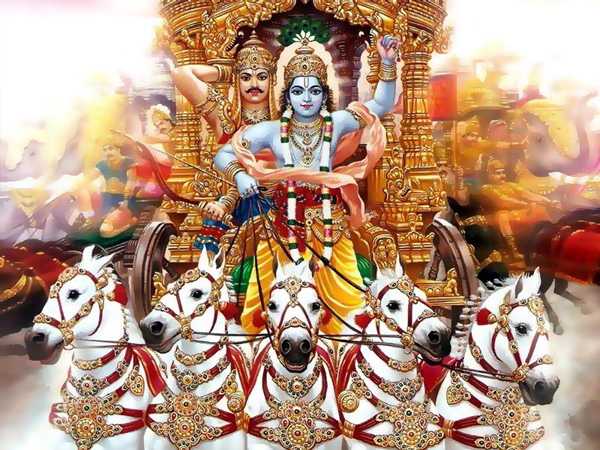Chapter 75

“Sanjaya said, ‘Both Vasudeva and Dhananjaya, afflicted with sorrow andgrief and frequently sighing like two snakes, got no sleep that night.Understanding that both Nara and Narayana were in rage, the gods withVasava became very anxious thinking, ‘What will come of it?’ Fiercewinds, that were again dry and foreboded danger, began to blow. And aheadless trunk and a mace appeared on the disc of the sun. And althoughit was cloudless, frequent thunders were heard, of loud report, mixedwith flashes of lightning. The earth with her mountains and waters andforests, shook. The seas, those habitation of Makaras, swelled O king, inagitation. The rivers ran in directions opposite to their usual course.The nether and upper lips of car-warriors and steeds and men andelephants began to tremble. And as if for gladdening the cannibals, onthat occasion foreboding a great accession of population to the domain ofYama, the animals (on the field) began to eject urine and excreta, andutter loud cries of woe. Beholding these fierce omens that made the hairstand on end, and hearing also of the fierce vow of the mighty Arjuna,all thy warriors, O bull of Bharata’s race became exceedingly agitated.Then the mighty-armed son of Pakasasana said unto Krishna. ‘Go, andcomfort thy sister Subhadra with her daughter-in-law. And, O Madhava, letalso that daughter-in-law, and her companions, be comforted by thee; Olord, comfort them with soothing words that are again fraught withtruth.’ Thus addressed, Vasudeva, with a cheerless heart, wending toArjuna’s abode, began to comfort his sorrowing sister afflicted withgrief on account of the death of her son.’
“Vasudeva said, ‘O lady of Vrishni’s race, do not grieve, with thydaughter-in-law, for thy son. G timid one, all creatures have but one endordained by Time. The end thy son hath met with-that becometh a hero ofproud lineage, especially who is a Kshatriya. Do not, therefore, grieve.By good luck it is that mighty car-warrior of great wisdom, of prowessequal to that of his father, hath, after the Kshatriya custom, met withan end that is coveted by heroes. Having vanquished numberless foes anddespatched them unto Yama’s presence, he hath himself repaired to thoseeternal regions, that grant the fruition of every wish, and that are forthe righteous. Thy son hath attained that end which the righteous attainby penance, by Brahmacharya, by knowledge of the scriptures, and bywisdom. The mother of a hero, the wife of a hero, the daughter of a hero,and a kinsman of heroes, O amiable one, grieve not thou for thy son whohath obtained the supreme end. The wretched ruler of the Sindhus, Obeautiful lady, that murderer of a child, that perpetrator of a sinfulact, shall, with his friends and kinsmen, obtain the fruit of thisarrogance of his on the expiry of this night. Even if he enters the abodeof Indra himself he will not escape from the hands of Partha. Tomorrowthou shalt hear that the head of the Sindhus hath, in battle, been cutoff from his trunk to roll on the outskirts of Samantapanchaka! Dispelthy sorrow, and do not grieve. Keeping the duties of a Kshatriya beforehim, thy brave son hath attained the end of the righteous, that end,viz., which we here expect to obtain as also others that bear arms as aprofession. Of broad chest, mighty arms, unreturning, a crusher ofcar-warriors, thy son, O beautiful lady, hath gone to heaven. Drive awaythis fever (of thy heart). Obedient to his sires and maternal relations,that heroic and mighty car-warriors of great prowess hath fallen a preyto death, after having slain thousands of foes comfortthy-daughter-in-law, O queen! Do not grieve too much, O Kshatriya lady!Drive away thy grief, O daughter, as thou shalt hear such agreeable newson the morrow. That which Partha hath vowed must be accomplished. Itcannot be otherwise. That which is sought to be done by thy husband cannever remain unaccomplished. Even if all human beings and snakes andPisachas and all the wanderers of the night and birds, and all the godsand the Asuras, help the ruler of the Sindhus on the field of battle; heshall still, with them, cease to exist tomorrow.'”




